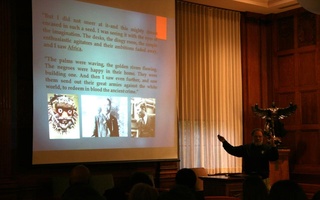The Cambridge City Council voted against a measure to televise an upcoming roundtable meeting—a proposal that some councillors said they hoped would increase transparency but others argued would limit discussion.
Though regular City Council meetings are recorded and aired live, roundtable meetings are not typically televised. According to some councillors, roundtable meetings are neither recorded nor broadcasted in order to encourage free discussion.
Councillor Minka Y. vanBeuzekom proposed that the April 25, 4 p.m. meeting—which will address major developments in Kendall and Central Squares—be televised.
“People work—they work during the week, and they’re tired at night, and they have families at home, and that’s the reality,” vanBeuzekom said. “At least they’d have a way to keep track of what’s happening.”
Councillor Craig A. Kelley supported vanBeuzekom’s measure to televise the roundtable meeting.
“I think this all should be televised,” Kelley said. “I don’t see the magic in not televising them and I think that a lot of useful information, or at least a lot of interesting information, doesn’t get beyond here because it’s not televised.”
During the meeting, Kelley said that he thought the final decision was “sort of un-American on our part.”
Six of the other councillors voted against the measure. Councillor Kenneth E. Reeves ’72 was absent for the vote.
According to Massachusetts Open Meeting Law, in all but a few situations, “all meetings of a public body shall be open to the public.” Additionally, “any person may make a video or audio recording of an open session of a meeting of a public body.” This law, however, does not require that the City Council televise its meetings.
Councillor Marjorie C. Decker, who voted against the measure, said that she thought that the Council can be more productive when the meetings are not televised.
“Whether we want to believe it or not, when the cameras get turned on in this room, the conversation is not the same level of conversation,” Decker said during the meeting. “If we televise them, they’re no longer roundtables. It actually completely overrides the purpose of a roundtable.”
Councillor Leland Cheung, who is also a student at the Harvard Kennedy School, expressed similar sentiments to Decker, and voted against the measure.
“The round table is like a study session where it gives the opportunity for councillors to really dive deep in a rapid way into an issue,” Cheung said. “When you televise it you have a very different format.”
—Staff writer Maya Jonas-Silver can be reached at mayajonas-silver@college.harvard.edu.
Read more in News
Eleven Bikes Stolen From Cycling TeamRecommended Articles
-
City Fails To Elect Mayor for Sixth TimeAfter six weeks of trying to elect a mayor, the Cambridge City Council has narrowed the race to three candidates and agreed to investigate the legality of a runoff election.
-
Cambridge City Council Discusses Two-Year GoalsThe Cambridge City Council met for a roundtable discussion last night, the first of four meetings to decide the city’s primary objectives for the next fiscal year.
-
City Council Still Unable To Elect MayorThough the Cambridge City Council was once again unable to select a new mayor—an issue which has remained unresolved since Jan. 2—the Council moved to aid a local dance center soon to be displaced.
-
City Council Fails To Elect MayorDuring a relatively brief Cambridge City Council meeting, the councillors failed for a seventh time to elect a mayor.
-
 Graduate Students Discuss Caribbean Diaspora at Conference
Graduate Students Discuss Caribbean Diaspora at Conference -
In Roundtable, Professors Talk Politics, HistoryA roundtable on the role of history and the law in the current presidential election drew a crowd in the Barker Center Tuesday night.













